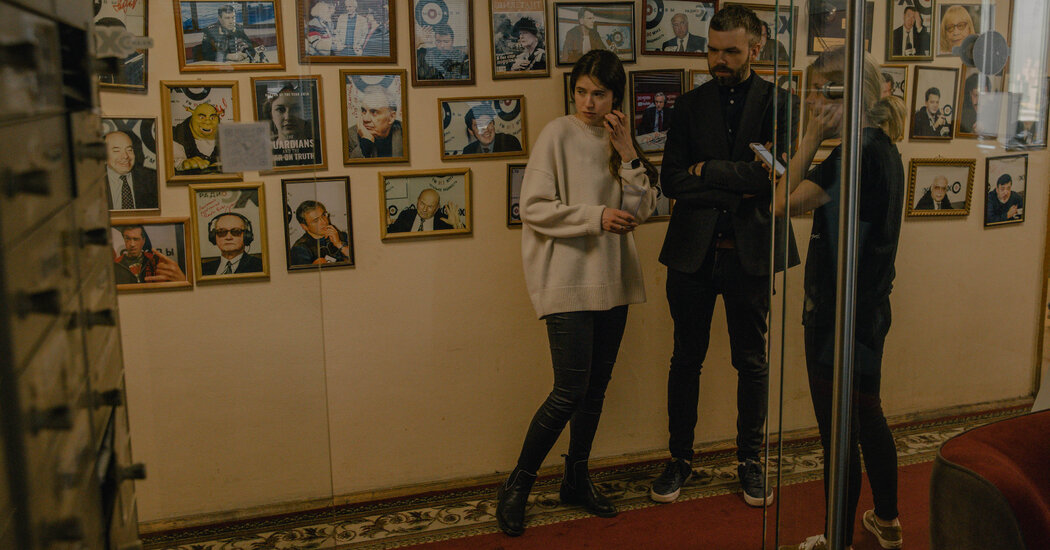
As President Vladimir V. Putin wages war against Ukraine, he is fighting a parallel battle on the home front, dismantling the last vestiges of a Russian free press.
On Thursday, the pillars of Russia’s independent broadcast media collapsed under pressure from the state. Echo of Moscow, the freewheeling radio station founded by Soviet dissidents in 1990 and that symbolized Russia’s new freedoms, was “liquidated” by its board. TV Rain, the youthful independent television station that calls itself “the optimistic channel” said it would suspend operations indefinitely.
And Dmitri A. Muratov, the journalist who shared the Nobel Peace Prize last year, said that his newspaper Novaya Gazeta, which survived the murders of six of its journalists, could be on the verge of shutting down as well.
“Everything that’s not propaganda is being eliminated,” Mr. Muratov said.
Precipitating the outlets’ demise were plans by the Russian Parliament to take up legislation on Friday that would make news considered “fakes” about Russia’s war in Ukraine punishable by yearslong prison terms. The Russian authorities have already made it clear that the very act of calling it a “war” — the Kremlin prefers the term “special military operation” — is considered disinformation.
“We’re going to punish those who spread panic using fakes by up to 15 years,” a senior lawmaker, Sholban Kara-ool, said on Thursday. During World War II, he said, such people “were shot on the spot.”
The crackdown on independent journalists — many of whom fled the country this week, fearing that even worse repressions were to come — added to the sense of crisis in Russia. The economy continued to reel from Western sanctions as airlines canceled more international flights and more companies suspended operations — including Ikea, the Swedish furniture retailer, a totem for Russia’s middle class and the employer of some 15,000 Russians.
Mr. Putin appeared unbowed by the crisis and the Western furor. He told President Emmanuel Macron of France in a phone call that his aim of securing “the demilitarization and neutral status of Ukraine” would be “achieved no matter what,” according to the Kremlin. A second round of peace talks in Belarus yielded no breakthrough, though Ukraine said Russia had agreed to “humanitarian corridors” to allow civilians to leave areas of intense fighting.
“Unfortunately, the results Ukraine needs are not yet achieved,” said Mikhailo Podolyak, one of the Ukrainian representatives.
Thursday evening, in nationally televised remarks, Mr. Putin for the first time personally acknowledged Russian casualties in the fighting and praised Russian troops as heroes who were fighting “fascists” akin to Hitler’s invading army.
Ukrainian resistance, Mr. Putin said, was only evidence of the population being brainwashed by Western propaganda and by neo-Nazis.
“I will never give up my conviction that Russians and Ukrainians are one people,” he said. “That’s even despite the fact that some of the inhabitants of Ukraine have been intimidated, and many have been fooled by neo-Nazi, nationalist propaganda.”
Many Russians, however, have not bought into the narrative. Lukoil, Russia’s second-biggest oil producer, on Thursday became the biggest Russian company to publicly distance itself from the war, publishing a statement from its board of directors calling for its “soonest cessation.”
And up to now, Russian independent media led by Echo of Moscow, TV Rain and Novaya Gazeta had given those Russians a voice.
“There’s a very broad antiwar mood in Russia — I’d say it’s genetic,” Aleksei A. Venediktov, Echo of Moscow’s longtime editor in chief, said in an interview on Thursday, referring to the lingering scars of World War II. “War is not victory. War is horror, it is tragedy, it is loss in every family.”
As a result, Mr. Venediktov argues, the Kremlin is intent on controlling the narrative of its “special military operation” in Ukraine even more intensely than it otherwise controls the news media.
Echo of Moscow is owned by Gazprom, the state energy giant, but has often broadcast sharp critiques of the Kremlin. Analysts believed the station survived thanks to Mr. Venediktov’s personal connections to the ruling elite and Mr. Putin’s desire to maintain a veneer of pluralism amid his creeping authoritarianism. For instance, it gave voice to supporters of the imprisoned opposition leader Aleksei A. Navalny and covered the wave of protests he inspired across Russia early last year.
During the war in Ukraine, Echo of Moscow has featured interviews with Ukrainian journalists who described the horrors of Russia’s invasion, a decision that appeared to cross a line. On Tuesday, the authorities took Echo of Moscow off the air for the first time since the Soviet coup attempt in 1991 and on Thursday, its board of directors decided to shut the station entirely.
“We came under the steamroller of military censorship,” Mr. Venediktov said.
TV Rain was founded in 2010 by a media entrepreneur, Natalia Sindeyeva, and a TV director, Vera Krichevskaya. It became a symbol of free-minded journalism, and a place where young journalists could launch their careers.
Though the Kremlin created challenges for the channel, it always found a way to persevere. In 2014, cable networks removed TV Rain from their bundles, costing the channel about 80 percent of its audience. It then pivoted to a subscription model.
On Thursday, TV Rain broadcast a full news report on YouTube, after which Ms. Sindeyeva announced that the outlet was shutting down, at least for the time being.
“We need time to exhale and think about how to continue,” Ms. Sindeyeva said. Roskomnadzor, the Russian telecommunications regulator, blocked the outlet on Tuesday, accusing it of inciting extremism, abusing Russian citizens, causing mass disruption of public calm and safety, and encouraging protests.
“I don’t want to cry because we’ve lived through so much in this life, we’ve dealt with so many difficulties and we never gave up,” said Ms. Sindeyeva. “We very much hope that we will be back on some platform because our work is so important to our audience.”
Russia-Ukraine War: Key Things to Know
A Ukrainian city falls. Russian troops gained control of Kherson, the first city to be overcome during the war. The overtaking of Kherson is significant as it allows the Russians to control more of Ukraine’s southern coastline and to push west toward the city of Odessa.
After TV Rain’s final broadcast, various employees — some of them having just fled the country — appeared on a livestream on the company’s YouTube channel. They gathered in the studio with Ms. Sindeyeva and over Zoom as more than 110,000 viewers tuned in. In speeches that turned emotional and tearful, they talked about their work, the state of the Russian news media and the channel’s accomplishments, and offered words of fortification for everyone watching.
Tikhon Dzyadko, the editor in chief of TV Rain, confirmed on Wednesday that he had left Russia out of concerns for his safety. “We have to be accountable to ourselves that we’re on the right side of history,” Mr. Dzyadko said.
At the end of the livestream, those who Zoomed in left, and everyone else walked out of the studio. “No to war,” Ms. Sindeyeva said as the lights went off.
For a few seconds, Tchaikovsky’s “Swan Lake” appeared. During the 1991 attempt to overthrow the Soviet Premier Mikhail S. Gorbachev, Soviet state television played “Swan Lake” on a loop.
It did the same as the country waited for the party leadership to select successors to Soviet premiers Leonid Brezhnev, Konstantin Chernenko and Yuri Andropov. It was a not so subtle hint: Even Mr. Putin is not forever.
Mr. Muratov, of Novaya Gazeta, said he understood Ms. Sindeyeva’s decision, and that she “is making the responsible decision in terms of protecting her journalists’ safety.”
Like his colleagues, Mr. Muratov has felt the pressure of the government closing in. In the last several days, he said the newspaper he runs, Novaya Gazeta, had received fines totaling 1,300,000 rubles, or about $12,000.
At Echo of Moscow’s offices on Thursday, Mr. Venediktov said that in a “regular country,” Echo of Moscow would be considered banal. “We’ve held on to old-fashioned, traditional journalism where all points of view must be shared and where forbidden topics can be discussed, political and not,” Mr. Venediktov said.
But Echo of Moscow refused to stick to official themes of triumph and progress, instead digging into the problems and the culprits. Ukrainian experts and politicians were invited to speak on air.
“Since everybody from the president to the leaders of the opposition listens to us, we are influential,” Mr. Venediktov said. “The authorities see a threat in us.”
A sticking point has been what to call the war in Ukraine.
“They want to give the population the impression that this is a short, effective, operation without a lot of victims,” said Andrei Kolesnikov, a senior fellow at the Carnegie Moscow Center think tank. “The regime gives a lot of attention to words, or to the lack of words.” He drew the example of Mr. Navalny, an opposition figure in Russia whom Mr. Putin does not refer to by name.
“This isn’t a question of media, this is about freedom of speech in the public sphere,” Mr. Venediktov said. “You can’t speak for or against something. That’s a crime.”
Reporting was contributed by Ivan Nechepurenko and Alina Lobzina.




